London (Parliament Politics Magazine) – Police plan to arrest anyone supporting the banned group Palestine Action at a London protest this weekend, warning arrests will proceed under terrorism laws.
As reported by The Guardian, police have warned that supporters of the proscribed group Palestine Action could face charges under terrorism laws.
After its ban under terrorism laws, a large demonstration opposing the decision has been planned by Defend Our Juries for this weekend.
What did an insider reveal about the upcoming crackdown?
According to a source involved in operational preparations,
“If they think showing up in large numbers stops us from making arrests under terrorism laws, they need to think again.
They added,
“They will be arrested. However we have to do it, they will be arrested for breaking terrorism laws.”
How will the Met handle protests amid terror law risks?
The Metropolitan Police are aware of the planned protest this Saturday but remain sceptical of claims that thousands will attend. Officers anticipate only a few hundred participants and warn that any arrests could lead to terrorism convictions.
During past big protests, police arrested many demonstrators. They checked their names and home addresses, and then they released them on bail for future legal action.
Police applied the same strategy during last year’s anti-immigration rally in Whitehall, which led to several arrests. The Met is set for a difficult weekend, with officers preparing for both a major pro-Palestinian march and anti-immigration protests set for Saturday.
The Met sources say the Met’s strategy will be adjusted in the coming days, and mutual aid from other forces may be requested if needed.
Officers face potential backlash from both political sides. Pro-Palestinian activists may accuse police of using excessive force, while critics on the right may argue the force failed to enforce anti-terror laws.
What did Defend Our Juries say about the “plot” allegations?
Defend Our Juries’ spokesperson rejected claims of a planned effort to paralyse law enforcement and judicial operations.
They stated,
“It’s great the Telegraph is helping us to spread the word, but there are serious inaccuracies in their story. First, it’s not a ‘Palestine Action’ campaign. Defend Our Juries is organising the campaign, as they must know since they’ve seen the briefing document. Given that PA is currently a proscribed organisation, that’s an important distinction.”
They added,
“Secondly, it’s not a ‘plot’. Plot implies something underhanded and secretive. This is an open and transparent campaign against an unjust law, which violates basic democratic freedoms. All materials, including the action briefing document, are available on the website.”
The spokesperson said,
“Third, we’re not planning to overwhelm the system. The police have a choice whether to arrest people or not. If the police show respect for the law and basic democratic rights, they will leave peaceful protesters be. It’s only if they choose to arrest peaceful protesters that they’ve got a problem, which is on them, not us.”
What did lawyers warn about the ban on Palestine Action?
The Netpol lawyers’ group letter was signed by 266 solicitors, barristers and legal academics, including 11 KCs and 11 law professors.
The letter states,
“Proscription of a direct-action protest group is an unprecedented and extremely regressive step for civil liberties. The conflation of protest and terrorism is the hallmark of authoritarian regimes. Our government has stated that it is committed to respecting the rule of law: this must include the right to protest.”
They added,
“To use the Terrorism Act to ban Palestine Action from direct action would be an abuse of this legislation and an interference with the right to protest. Misusing terrorism legislation in this way against a protest group sets a dangerous precedent, threatens our democratic freedoms, and would be a terrifying blow to our civil liberties.”
What did Yvette Cooper say about banning protest groups?
Home Secretary Yvette Cooper stated,
“National security is the first duty of any government, we will always take the action needed to protect our democracy and national security against different threats.”
She said,
“Maniacs Murder Cult, Palestine Action and the Russian Imperial Movement have each passed the threshold for proscription based on clear national security evidence and assessments.”
Ms Cooper added,
“The right to protest and the right to free speech are the cornerstone of our democracy, and there are countless campaign groups that freely exercise those rights. Violence and serious criminal damage have no place in legitimate protests.”
When was Palestine Action established?
- Started in 2020: Palestine Action began in the UK to protest companies linked to Israel’s military, like Elbit Systems.
- Bold Actions: They made headlines by damaging and occupying arms factories to stop their work and raise awareness.
Ban on the Palestine Action in the UK
- Group banned (June 2025): UK banned Palestine Action after damage to military planes. Support could mean 14 years in jail.
- Court challenge allowed (July 2025): Court says group can challenge the ban, but it stays for now.
- Mass arrests: 200+ arrested. Critics say anti-terror laws are being misused.


